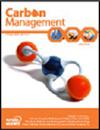一种估算温室气体排放和清单方差和协方差的程序
IF 3.2
4区 环境科学与生态学
Q3 ENVIRONMENTAL SCIENCES
引用次数: 1
摘要
摘要:本文提出了一种估算企业多源二氧化碳排放总量均值和方差的方法。该程序也很容易适用于估计其他温室气体清单的这些参数,并确定公司温室气体总排放量的可靠置信区间。我们的方法是对现有方法的改进,这些方法假定不同源的排放之间是独立的。提出的方法的基础是一个迭代分解过程,用于分析公司运营中使用的活动、原材料和其他投入之间的排放相关性。根据这些相关性以及对排放因子均值和方差的个人估计,我们展示了如何为一家公司的温室气体排放总量生成一个置信区间。以一个假设的自行车和汽车玩具制造工厂为例,说明了该方法的应用,该工厂的二氧化碳排放总量在一个精确的置信区间内估计。本文章由计算机程序翻译,如有差异,请以英文原文为准。
A procedure to estimate variances and covariances on GHG emissions and inventories
Abstract This study presents a method for estimating the mean and variance of total CO2 emission from multiple sources used by a company. The procedure is also readily applicable to estimate these parameters for other greenhouse gases (GHG) inventories and to determine a reliable confidence interval for the total emissions of GHG of a company. Our method represents an improvement over the existing methods that assume independence between emissions from different sources. The foundation of the proposed method is an iterative decomposition process applied to analyze the emissions correlations among activities, raw materials and other inputs used in a company’s operations. From these correlations and the individual estimates of means and variances of emission factors, we show how to generate a confidence interval for the total GHG emission of a company. The application of the method is illustrated for a hypothetical manufacturing plant of bicycles and car toys, whose total CO2 emission is estimated within a precise confidence interval.
求助全文
通过发布文献求助,成功后即可免费获取论文全文。
去求助
来源期刊

Carbon Management
ENVIRONMENTAL SCIENCES-
CiteScore
5.80
自引率
3.20%
发文量
35
期刊介绍:
Carbon Management is a scholarly peer-reviewed forum for insights from the diverse array of disciplines that enhance our understanding of carbon dioxide and other GHG interactions – from biology, ecology, chemistry and engineering to law, policy, economics and sociology.
The core aim of Carbon Management is it to examine the options and mechanisms for mitigating the causes and impacts of climate change, which includes mechanisms for reducing emissions and enhancing the removal of GHGs from the atmosphere, as well as metrics used to measure performance of options and mechanisms resulting from international treaties, domestic policies, local regulations, environmental markets, technologies, industrial efforts and consumer choices.
One key aim of the journal is to catalyse intellectual debate in an inclusive and scientific manner on the practical work of policy implementation related to the long-term effort of managing our global GHG emissions and impacts. Decisions made in the near future will have profound impacts on the global climate and biosphere. Carbon Management delivers research findings in an accessible format to inform decisions in the fields of research, education, management and environmental policy.
 求助内容:
求助内容: 应助结果提醒方式:
应助结果提醒方式:


